Yemen crisis: Exiled human rights minister foresees break-up of her nation if Houthi militias refuse to negotiate
The war-torn nation was only unified in 1990, but Houria Mashour believes a permanent split of south and north may be the only viable solution to the conflict

A permanent split of south and north may be the only viable solution for Yemen’s future if the Houthi militia, which overthrew the government in a coup in September, refuses to come to the negotiating table, according to Houria Mashour, the exiled Yemeni Human Rights Minister.
After the coup and the arrival of armed men on motorcycles at her office, Ms Mashour fled the country in February and temporarily resides in Beirut.
“I was advised not to go back,” Ms Mashour said simply, speaking to The Independent this week. She is used to being harassed for her work on gender equality, the abolition of child marriages and her criticism of ousted president Ali Abdullah Saleh. But that was before a war. “Now I feel they are threatening my life. It is not just in the media, they are armed. And assassinations are widely happening in Yemen.”
Returning home is impossible. Saudi warships have sealed the ports and the airports are closed.
Ms Mashour became Yemen’s first human rights minister after the 2011 revolution, which saw the ousting of Mr Saleh after more than three decades in power. He then formed an alliance with his former enemy, the Houthi militia, which has been fighting for more independence for the Zaydis, a Shia sect whose believers form up to 40 per cent of the Yemeni population. The UN Security Council placed an arms embargo on both Mr Saleh and the Houthis this week.
The coup escalated in February, and president Abd Rabbuh Mansur Hadi fled to Saudi Arabia. A Saudi-led coalition of Arab states has been bombing the country ever since.
Ms Mashour sees Mr Saleh as a key actor. “He created this scenario,” she said.
Keen to hand over power to his son Ahmed, Mr Saleh propagates the idea that only his family can keep Yemen in check. “All the time he wants to give that message to the others; that he is the guarantor. That he is the leader who can rule the country, who can keep power, who can control everything. And that if he leaves, everything will collapse,” Ms Mashour said.
Yemen was only unified in 1990, and saw a conflict between the North and the South four years later. When Ms Mashour’s ministry was occupied by at least 30 armed rebels in September, the native southerner flirted with the idea of splitting the country again.
“When I was in Aden and they rushed into my ministry, I said, enough, I will not go back to Sanaa, I will stay here, we don’t want to continue together.” She still hopes for a future as one country, but support for secession is growing in the South. “Right now, we should be committed to the outcome of the national dialogue, and the constitution. But if it doesn’t work, I think the last scenario will be the separation,” she said.
In the last three weeks, there have been more than 500 deaths, including 364 civilians, according to the UN. The rebels hide between the population, insists Ms Mashour, who supports the intervention. “They go between the houses, in hospitals, in mosques, in the football stadium.” She longs to return to her home town, the southern city of Aden. “If there is some place which is a little bit safe; if Aden becomes safe, I will go back to my country”.
But in addition to bombardments, tribal popular committees fight the Houthis in the street. “They get the weapons from the coalition aircraft, which drop weapons, food and medicine for them in some places.” A humanitarian crisis looms: there are shortages of water, food and electricity.
Those benefiting most from the crisis are al-Qaeda in the Arabian Peninsula, who are gaining territory in the east and captured Mukalla, a port.
Ms Mashour is positive Iran is supporting the Houthis. “It is clear, they used to go regularly to Iran and the ideological ideas are Iranian ideas,” she insisted.
Peace talks in Riyadh were endorsed by the UN Security Council this week. These talks, Ms Mashour said, would be the only way to avoid Yemen slipping into a prolonged war.
Subscribe to Independent Premium to bookmark this article
Want to bookmark your favourite articles and stories to read or reference later? Start your Independent Premium subscription today.

Join our commenting forum
Join thought-provoking conversations, follow other Independent readers and see their replies